- Home
- Jim Eldridge
Roman Invasion Page 8
Roman Invasion Read online
Page 8
“The officer is sending for reinforcements,” said Pentheus. “He has chosen the four fastest runners. One of them should get through.”
“The nearest soldiers are eight miles behind us,” I said. “It will take time for the messengers to get to them, and even longer for the reinforcements to reach us. And even if the whole legion were here, which will not happen, the Caledonians would still outnumber us by four to one.”
“True,” said Pentheus.
The mass of Caledonian warriors on both sides had not advanced any further down the slopes. They still stood in front of the forest to both the north and the south, calling and chanting and banging their spears against their shields and against the sides of their chariots.
The officer in command came to the cart and muttered something to Pentheus, who nodded and flicked the reins at the horse, and then began to turn our cart back the way we had come, towards the west.
“The officer in charge wants non-combatants out of the way!” he shouted to me. “That’s you, me and Talos. So we’re pulling back to a safe place, ready to flee if the Romans are defeated.”
Pentheus urged the horse to go faster, heading back to the entrance to the valley. When we were a good distance from both the Roman force and the Caledonians, Pentheus pulled the horse to a halt.
“It is my hope the Caledonians will not bother with us,” he said. “Not until after they have dealt with the Romans. And, by then, let us hope the reinforcements will have arrived.”
“Reinforcements!” I exploded. “There are twenty thousand Caledonian warriors about to attack just two thousand Roman soldiers. By the time the reinforcements get here the Romans in the valley will have been massacred, and us with them!”
Pentheus shook his head.
“You are a Brigante prince, kept hostage by the Romans. The Caledonians will set you free. Or perhaps take you hostage for ransom for themselves. Either way, I believe you will be safe.”
“And you and Talos?”
Talos looked at me and gave a big shrug and a deep sigh.
“Yes,” sighed Pentheus. “To the Caledonians we are obviously Romans. We will be killed, unless the Romans in the valley defeat the Caledonians, or reinforcements arrive to rescue us. Sadly, this old horse will not outrun the Caledonian chariots.”
A series of loud yells and howls came to our ears, and we saw that the masses of Caledonian warriors were running down both slopes towards the Romans, chariots racing and swords and spears waving. The attack had begun.
Chapter XIX
As the shouting and screaming Caledonians swarmed down from the forested ridges I was sure they would just sweep across the Romans and destroy them. The Romans showed no signs of panic, despite being heavily outnumbered. A row of soldiers armed with slingshots stepped forward from either side of the ranks of the Roman force and faced both onslaughts of the oncoming Caledonian warriors. As I watched, each man swung his slingshot around his head fast, and then hurled the stone it contained hard and straight into the front rank of the Caledonians. The effect was devastating. The stones struck the first of the charging Caledonians and bodies tumbled down, which were trampled on by those rushing behind. Another row of soldiers stepped forward, also with slingshots fully loaded, and let loose another volley, bringing down yet more Caledonians. These volleys had killed or seriously injured many of the warriors at the front of the charge, and caused more confusion as the warriors rushing behind found themselves tripping and falling over the bodies of their fallen comrades. But still they came on, still yelling war cries and waving swords and spears.
Another line of men stepped forward from the ranks of the Romans, these armed with short bows with which they let loose a hail of arrows straight into the charging Caledonians. Again, hundreds tumbled to the ground. The slopes were now littered with bodies of the warriors, but those who had survived the stones and arrows rushed onwards, yelling and screaming their chilling war cries. Altogether I guessed that more than a thousand Caledonians had been killed by slingshots and arrows. The Roman archers let fly with another hail of arrows, straight into the Caledonian hordes, and hundreds more crashed to the ground. Then as the Roman archers stepped back into the ranks, suddenly the outer ring of Romans brought their shields up, forming a wall of wood and metal. They began to spread out, gradually widening into a circle, and with every new soldier who stepped forward to make this circle wider, another shield was brought into the wall. At the same time the Romans thrust their spears forward between their shields and held them firm, and as the remaining Caledonians finally reached the Romans, they either ran at full tilt into a shield, or onto a spear point. The front rows had no chance to dodge because of the press of warriors chasing and pushing behind them.
“Outnumbered ten to one, you said, young warrior,” said Pentheus beside me. “How many now?”
I shook my head in awe at the iron discipline of the Romans as they repulsed the attack.
“I don’t know,” I said. “Three thousand dead Caledonians?”
“Nearer four I think,” said Pentheus.
“That’s still eight to one,” I pointed out.
“Maybe, if you count just numbers,” said Pentheus. “But watch. As we saw in their practice, the Romans have formed themselves into two circles, one inside the other. That outer circle is made up of a thousand soldiers, standing tightly close together behind their wall of shields. No matter how many Caledonians there are, only a thousand of them can actually fight the Romans hand to hand.”
“But as a Caledonian warrior falls, there’s another to take his place,” I said.
“True,” agreed Pentheus. “And if a Roman soldier falls, one from the inner circle will step forward to take his place. And if that soldier dies, then the circle closes up and becomes a little smaller. The Caledonians may outnumber the Romans, but most of them are just standing behind the others waving their swords and shouting, and getting in the way.”
As we stood and watched I realized that what Pentheus said was true. Both sides were fighting bravely with no fear of dying, but while the Caledonians just attacked wildly with brute force, the Romans defended with a discipline I’d never seen in a battle before. They fought like one man, moving together in the same way at the same time, their shields opening together and spears and swords being thrust out, then the shields closing to form that tight defensive wall again. Now and then I saw a Roman soldier fall to the ground, but each time the circle of shields just closed up, as Pentheus had said. Meanwhile the Caledonians were dropping to the ground like so many swatted flies.
Suddenly a great shouting went up from among the Caledonians, a different kind of war cry, and they began to fall back from the Romans. Then they began to run, all of them fleeing, but this time in one direction, to the north, running up the slope, treading on the dead bodies of their comrades as they did so. I expected the Romans to give chase, but they remained where they were, in their circle of shields.
“They know the trick,” said Pentheus. “The Caledonians want the Romans to chase after them thinking they are running away, but if they do that, once the Roman circle is broken the Caledonians will turn and attack them again, and this time they’d be able to cut them to pieces. Then it really would be a case of six men against one.”
Pentheus was right. The Caledonians stopped before they reached the forest at the top of the slope and turned, looking down on the Romans. When the Romans didn’t move but stayed where they were, the Caledonians began to jeer at them, shouting at them that they were cowards. But still the Romans stayed where they were, within their circle of shields, swords and spears poised ready for another attack.
For their part, the Caledonians stayed out of the trees and carried on calling and jeering at the Romans for a while, and then they fell silent and stood and glared, with just a few angry shouts coming from them. And then they began to beat their swords on their shields and chant again, their war cries rising and falling like songs. And when the drumming and chanting seemed t
o have reached their peak, once more they raced down the slope towards the Romans, whooping and yelling and roaring, swords and spears raised and waving. But this time they were running over the bodies of their fallen comrades, and on grass that was wet and slippery with blood.
As before, the soldiers armed with slingshots stepped forward and sent forth a volley of well-aimed stones, and then immediately the Roman archers took their place and let fly with a hail of arrows, bringing down more of the Caledonians. The northern slope was now looking like a butchery, with dead bodies lying everywhere.
As those Caledonians who had survived this latest burst of stones and arrows neared the Roman force, once more the Roman shields came up to form a long defensive line of wood and metal, with swords and spear points sticking out from the wall.
“They cannot win,” I muttered. “The longer this goes on, the more Caledonians will die.”
Even as I spoke, the Caledonians suddenly halted their advance down the slope before they reached the circle of Roman shields and began to shout and jeer again, waving their swords and spears over their heads. By now I guessed there were only about ten thousand of them left alive. Ten thousand Caledonian warriors dead to just a few hundred Roman casualties. As before, the Romans remained where they were, refusing to be drawn out from their circle to attack the Caledonians. Instead they just waited, poised for action, while the warriors shouted and cursed them from a distance. And then, the Caledonians fell silent and began to head up the slope again, every now and then a warrior turning and hurling abuse down at the Romans. But still the Romans did not move, just waited in their circle, ready in case the Caledonians attacked again.
The Caledonians disappeared into the forest at the top of the slope, and then there was silence from the forest.
Still the Romans did not move.
“They will wait,” explained Pentheus. “Just in case it is a trick.”
But it was no trick. After half an hour the Caledonians had not reappeared. And then there came the sound of thousands of running feet from the west, and I turned to see the Roman reinforcements arriving at a fast march, their booted soles crashing down on the new stone road. As they came in sight, there was a shouted command from within the circle of Roman soldiers, and it began to disperse and head towards the reinforcements to join up into an even stronger force. But it was not necessary. I knew in my heart the Caledonians had gone.
“Now do you see why the Romans will always win?” said Pentheus. “Two thousand Roman soldiers defeated twenty thousand of your fiercest and bravest British warriors. But fierceness and bravery aren’t enough. The Roman army is a disciplined force, the most disciplined there ever has been. The Caledonians have suffered a major defeat today.”
“But they will fight again,” I said. “They will never stop fighting. Nor will we Carvetii.”
“Then you will die, just like those ten thousand Caledonians did today,” said Pentheus.
Chapter XX
After the battle, the commander ordered camp to be made. I was surprised how quickly the Romans returned to their day-to-day business. When we Britons fought a victorious battle, the celebrations would last for many days, with ale being drunk and stories being told of the fighting, and wounds and weapons being proudly displayed. There were no such celebrations in the Roman camp. They set to work to treat their injured and make sure the camp was secure in case the Caledonians returned.
When that was done, the Romans laid out their dead ready for burial. Then they dragged the bodies of the Caledonians into large piles where they had fallen. And, unlike the previous attacks, they cut the heads off the dead Caledonians and hung them from the branches of the trees. This act was more than just sending a warning to anyone else who dared rise up against them. They knew that we Britons believe the head to be where the soul lies. That is why, after a victory, our warriors cut off the heads of our enemies and hang them from the walls of our huts. To possess the head of an enemy is to own his spirit and so become more powerful. The head of an enemy is an offering to the gods. The previous attacks had been skirmishes by comparison that had barely affected the Romans, so they had shown their contempt for their attackers by simply hanging their dead bodies from the trees to rot. The victory over the tens of thousands of Caledonians had been a major one and the Romans meant to make sure that the Britons remembered it for a long time and took notice. By cutting off the heads of the dead Caledonians and leaving them to rot in the open air, the Romans were letting the Caledonians know that their gods were stronger than our British ones.
The one question that hung over me was: had Simeon survived the battle? While Pentheus and Talos began to make the tent and prepare our fire for the evening, I excused myself from helping them and said I needed to be on my own to walk and think. My real reason was to walk through the camp and see if I could spot Simeon. I did think of going to where the dead Roman soldiers had been laid out to see if his body was among them, but guards had been placed near the bodies to protect them from crows, and other animals who fed on carrion, while they awaited burial. I thought the guards might get angry at a British boy walking among their dead, examining them, and chase me away.
I wandered through the Roman camp for almost an hour, but saw no sign of Simeon. No one stopped me or asked me what I was doing; all the soldiers knew about me by now, and had become used to me walking free among them, even though I was a hostage.
By now evening was falling and the blanket of darkness was coming down and the fires outside the tents burnt bright red, sending sparks up into the sky. The smells of food cooking over the fires came to my nostrils, and I guessed that Pentheus and Talos would be preparing our meal. I was heading towards our tent, when a rough hand was suddenly thrown over my mouth from behind and I felt the point of a dagger dig into the skin of my back.
“Keep quiet, boy!” rasped a harsh voice in my ear. It was Simeon!
We were at the outer edge of the camp. I looked around. Everybody seemed too busy to take any notice of what was happening. Simeon released his hand from my mouth and grabbed my arm, his hard fingers digging into the flesh. I could feel the point of his dagger painfully in my back.
“Walk!” he commanded me in a savage whisper.
With his firm grip on my arm he guided me away from the glow of the campfires. He kept walking, half dragging me along with him, his fingers biting painfully into my arm. I did my best to try and show him that I was not afraid, but inside my bowels churned with the fear of what was going to happen to me. An even bigger ache inside me was the knowledge that I would never see my mother or Aithne again. I wanted to let them know how much I cared for them, and how – even at the end – I had fought for our British cause.
Ahead of us there were sentries on guard duty, but their backs were turned to us because they were watching out for attacks from outside the camp. Simeon hesitated, then decided not to risk taking me past the sentries. Instead, he dragged me towards the supply wagons, which were gathered together in a dark corner of the camp.
“Don’t waste my time begging for mercy!” he snapped.
“I wouldn’t lower myself to do that,” I answered defiantly.
It was strange, but now that I was faced with the reality of my death, I no longer felt so sure it was the will of the gods. I had been saved from death many times on this journey: by Talos, by Pentheus, by the soldiers who had stopped Simeon from killing me before. Suddenly much of what Pentheus said made sense. Perhaps my death was not the will of the gods after all. Perhaps they had been showing me they wanted me to live. Yet they had brought me here. Or had they? Possibly not, because it was I who had come here searching for Simeon. I who had deliberately walked into his trap. I was a fool!
As this realization struck me Simeon slashed at me with the dagger. I leapt to one side, but not quick enough. I felt a sharp pain in my arm, and then the wetness of blood.
I crouched, my eyes on the dagger, ready to dodge when he tried to strike again.
“Simeon!
”
A hissed call behind him made him turn, surprised.
Standing behind him were two of his soldier friends. I was sure they were the same two who had saved me from Simeon before.
“Simeon, you must not do this!” said one urgently. “The commander will see it as treason, because the governor himself gave us this boy as our hostage. He is under our protection. Remember what we said: what happens to a legion where even the thought of treason is suspected. Decimation! Is that what you want?”
Simeon scowled, his face twisted in fury.
“What I want is Asras’s death avenged!” he raged.
“It was avenged here today when we defeated the Caledonians,” said the other soldier.
Simeon shook his head, raging with anger.
Simeon glared at them both, and then shook his head. “This boy is going to die. Now!”
And with that Simeon swung round towards me, his dagger raised to plunge it into me. But, before he could, one of the soldiers leapt forward and grabbed him and pulled him back from me. Raging with fury, Simeon slashed at him with the dagger, cutting into his shoulder. He was just pulling the dagger back for another blow when the other soldier produced his sword and thrust it hard into Simeon’s body.
Simeon stopped and staggered back, his mouth wide in astonishment. Then he crumpled to the ground, dead.
The soldier turned to me.
“Go!” he said. “Get back to the surveyor and his boy. We’ll take care of this.”
I stood there, stunned.
“But…” I began.
“Go!” he repeated urgently. “Go, or we will all be killed!”
I nodded and then began to hurry back towards the glow of the campfires. I was alive!
Chapter XXI
I arrived back at the tent and found Pentheus and Talos waiting for me. Pentheus looked worried when he saw the cut on my arm.
“Talos,” he said, “your medical skills are needed.”

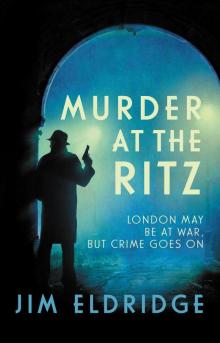 Murder at the Ritz
Murder at the Ritz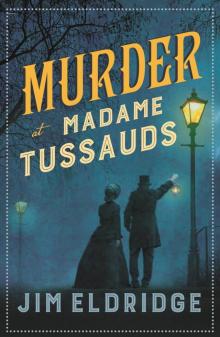 Murder at Madame Tussauds
Murder at Madame Tussauds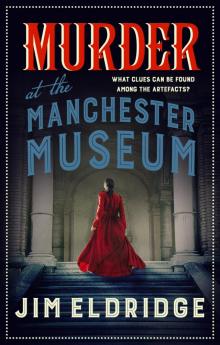 Murder at the Manchester Museum
Murder at the Manchester Museum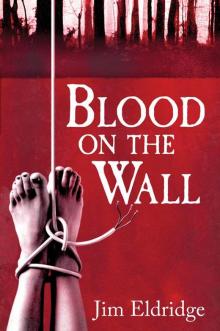 Blood On the Wall
Blood On the Wall 4.3.2.1
4.3.2.1 Jungle Kill (Black Ops)
Jungle Kill (Black Ops)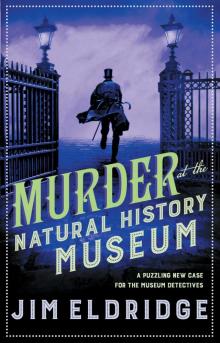 Murder at the Natural History Museum
Murder at the Natural History Museum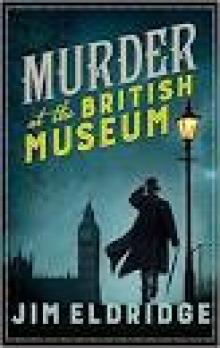 Murder at the British Museum
Murder at the British Museum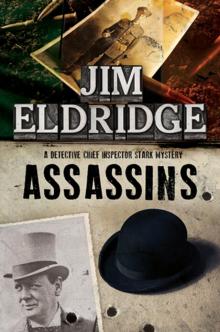 Assassins
Assassins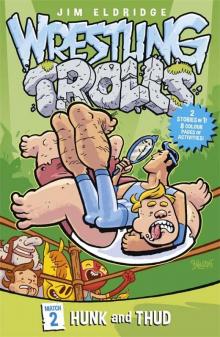 Hunk and Thud
Hunk and Thud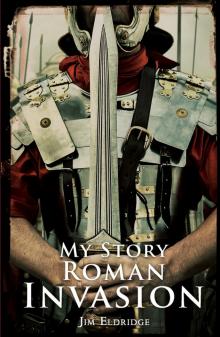 Roman Invasion
Roman Invasion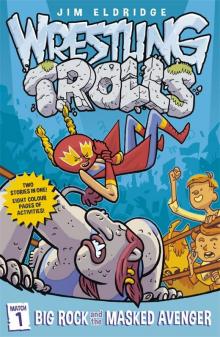 Big Rock and the Masked Avenger
Big Rock and the Masked Avenger The Last Enemy
The Last Enemy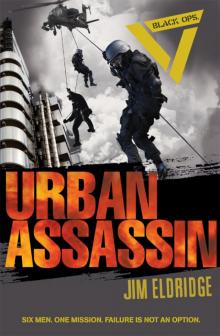 Urban Assassin
Urban Assassin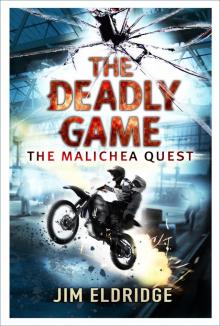 The Deadly Game
The Deadly Game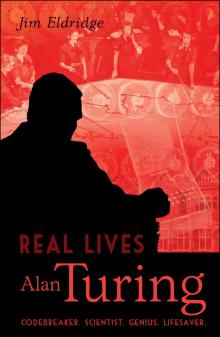 Alan Turing
Alan Turing The Lethal Target
The Lethal Target The Giant Rumble
The Giant Rumble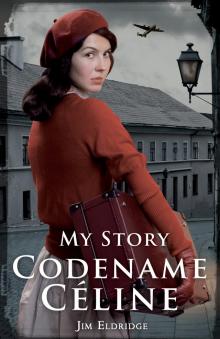 Codename Céline
Codename Céline Death in the Desert
Death in the Desert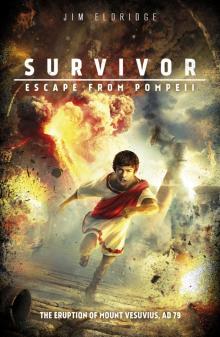 Escape from Pompeii
Escape from Pompeii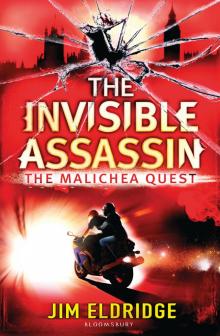 The Invisible Assassin
The Invisible Assassin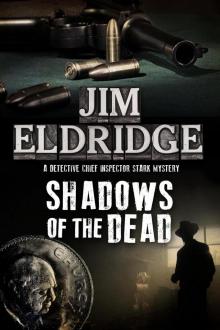 Shadows of the Dead
Shadows of the Dead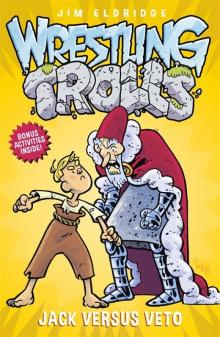 Jack Versus Veto
Jack Versus Veto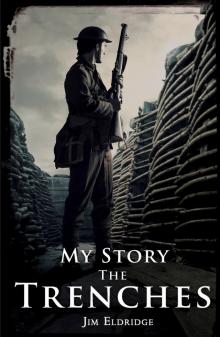 The Trenches
The Trenches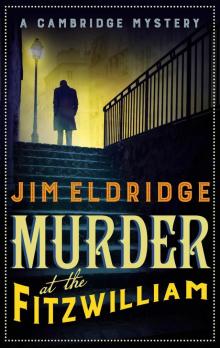 Murder at the Fitzwilliam
Murder at the Fitzwilliam Coming Home
Coming Home